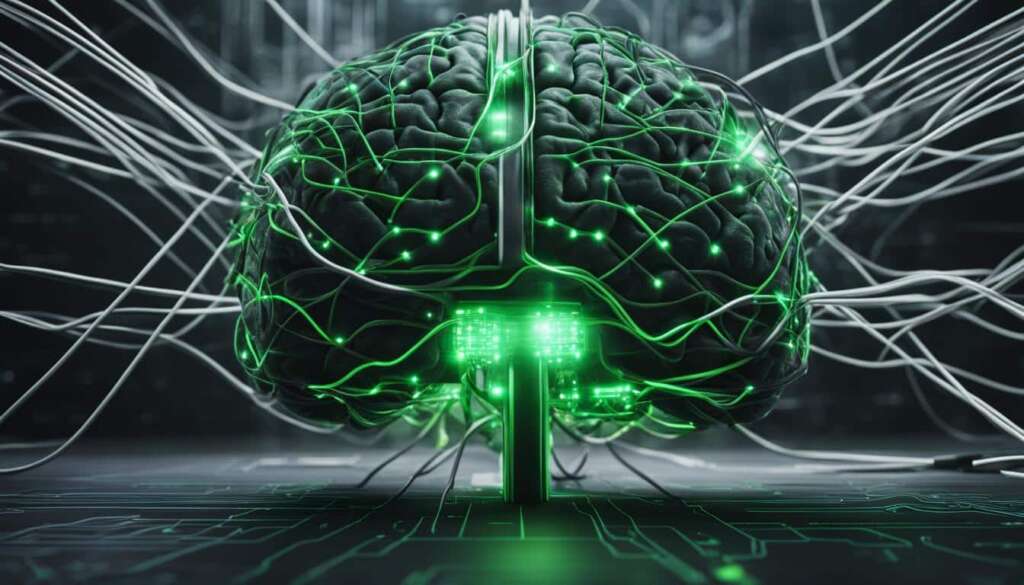Table of Contents
Affective computing, with its roots in computer science, psychology, and cognitive science, is a cutting-edge field that aims to recognize, interpret, and simulate human emotions. It has the potential to revolutionize various areas, including mental health care, immersive therapy, wearable devices, and virtual therapists.
In the realm of mental health care, affective computing can enable emotion analysis and sentiment analysis to provide valuable insights into patients’ emotional well-being and help tailor treatment plans accordingly. Through facial expression recognition, voice recognition, and analysis of physiological signals, such as heart rate and skin conductance, affective computing allows for emotion detection and recognition, enabling a more comprehensive understanding of users’ emotional states.
Machine learning and artificial intelligence play crucial roles in affective computing, as they facilitate the interpretation of emotional cues, resulting in more accurate analyses and simulations. These technologies have the potential to provide personalized emotional support through chatbots and virtual therapists.
As affective computing continues to advance, ethical and privacy concerns need to be addressed to ensure responsible and ethical use of this technology. Safeguarding user data and preventing unauthorized access are paramount considerations. Additionally, the presence of biases within affective computing systems must be carefully examined and mitigated to ensure fairness and equitable outcomes for all users.
Affective computing is an exciting and rapidly evolving field with immense potential. By leveraging advancements in AI, machine learning, and the analysis of physiological signals, affective computing has the power to enhance mental health care, revolutionize immersive therapy, and provide personalized support in various industries. With continued research and development, the future of affective computing looks promising, and it will undoubtedly contribute to the well-being and emotional support of individuals worldwide.
Understanding Affective Computing
Affective computing seeks to create sophisticated systems and devices capable of recognizing, interpreting, processing, and simulating emotions. This field merges insights from computer science, psychology, and cognitive science to infuse the digital experience with human-like qualities. The concept of affective computing was first introduced by Rosalind Picard in 1995, and since then, it has made remarkable strides thanks to advancements in artificial intelligence, machine learning, and sensor technology. By capturing emotional cues, processing data, and interpreting and simulating emotions, affective computing aims to bridge the gap between technology and emotional intelligence.
Emotions play a crucial role in human interaction and decision-making processes. They provide valuable context and insights for understanding human behavior and preferences. Affective computing leverages this understanding to create systems that can empathize with users, adapt to their emotional states, and provide personalized experiences.
Technology acts as the driving force behind affective computing. Machine learning algorithms and artificial intelligence techniques enable computers to analyze and interpret emotional data. Sensor technologies, such as facial expression recognition, voice recognition, and physiological signal monitoring, capture emotional cues that serve as input for affective computing systems.
Affective computing incorporates aspects of emotional intelligence to enhance the capabilities of digital systems. By simulating emotions, these systems can respond to users in a more empathetic and human-like manner. They can analyze verbal and non-verbal cues, such as facial expressions, tone of voice, and body language, to gain deeper insights into users’ emotional well-being.
Affective computing holds great promise in transforming various industries, including mental health care, education, marketing, and entertainment. By leveraging emotional data, systems powered by affective computing can provide personalized mental health support, enhance educational experiences, tailor marketing campaigns based on customer sentiment, and create more immersive and emotionally engaging forms of entertainment.
Figure 1: Image illustrating the concept of affective computing
How Affective Computing Works
Affective computing involves the recognition of emotional cues, which can be explicit or implicit. Emotion recognition systems analyze these cues, such as facial expressions, spoken words, heart rate, and skin conductance, to discern the user’s emotional state. Affective computing also employs cognitive computing principles to enable machines to simulate human thought processes and decision-making, resulting in a better understanding and empathy towards users.
Application Areas of Affective Computing
Affective computing, with its ability to recognize and simulate emotions, finds applications in various industries, delivering personalized and empathetic experiences. Let’s explore some key areas where affective computing is making a significant impact:
1. Healthcare
In healthcare, affective computing plays a crucial role in mental health monitoring, patient care, and assistive technologies. By analyzing emotional cues such as facial expressions and voice patterns, affective computing can help healthcare professionals understand and respond to patients’ emotional states. This technology has the potential to enhance diagnostic accuracy, improve treatment outcomes, and provide more personalized care.
2. Education
In the field of education, affective computing can revolutionize learning experiences. Adaptive learning systems can use emotional data to tailor educational content and activities based on students’ needs and preferences. Emotion-aware tutoring can provide personalized support and guidance to students, facilitating their emotional well-being alongside their academic progress. Additionally, affective computing can contribute to teacher training by analyzing and improving educators’ emotional engagement with students.
3. Marketing and Advertising
Affective computing offers exciting possibilities for marketing and advertising. By analyzing customer sentiment and emotional responses, companies can better understand consumer behavior and preferences. This knowledge enables personalized marketing campaigns and targeted advertisements that evoke desired emotional responses. By creating emotional connections with customers, businesses can enhance brand loyalty and increase sales.
4. Entertainment and Gaming
Affective computing is transforming the entertainment and gaming industry by creating immersive and emotionally engaging experiences. Emotion-driven narratives adapt in real-time based on the player’s emotions, providing personalized and captivating storytelling. Affective computing can also enhance gaming experiences by adjusting difficulty levels based on the player’s emotional state, creating a more dynamic and engaging gameplay. Additionally, affective computing can offer personalized recommendations for music and movies, tailoring entertainment choices to individual preferences.
https://www.youtube.com/watch?v=_zibNbzWZqA
As demonstrated, affective computing has a wide range of applications, impacting sectors such as healthcare, education, marketing, and entertainment. By harnessing the power of emotions, this technology brings us closer to creating highly personalized, empathetic, and engaging experiences. The potential for affective computing to improve mental health, enhance learning outcomes, drive marketing strategies, and revolutionize entertainment experiences is immense.
Ethical Considerations and Challenges
While affective computing offers numerous benefits, it also raises ethical concerns. Privacy, data security, bias, and ethical guidelines are critical considerations in the responsible and ethical use of affective computing.
Privacy:
A major concern in affective computing is the privacy of emotional data. As systems analyze and interpret emotions, sensitive information is collected, raising concerns about how this data is stored, used, and protected. Safeguarding privacy and ensuring that emotional data remains confidential is crucial for user trust and compliance with privacy regulations.
Data Security:
Data security is paramount when dealing with emotional data in affective computing. Robust security measures are necessary to prevent unauthorized access, data breaches, and potential misuse of personal emotional information. A comprehensive approach to data security, including encryption, access controls, and secure storage practices, is essential to uphold user confidence.
Bias:
Bias in affective computing systems poses a significant challenge that needs to be addressed. If the systems are not designed and trained to be unbiased, they may produce unfair outcomes and perpetuate existing inequalities. Ensuring fairness and minimizing biased results require diverse and representative training datasets, careful algorithm design, and regular audits of the system’s performance.
Ethical Guidelines:
Developing ethical guidelines is crucial to guide the responsible development and use of affective computing technology. These guidelines should encompass principles such as transparency, informed consent, fairness, accountability, and respect for individual autonomy. By adhering to ethical guidelines, organizations can mitigate potential risks and promote the ethical use of affective computing in various domains.

In conclusion, ensuring privacy, data security, addressing bias, and developing ethical guidelines are key to harnessing the full potential of affective computing while maintaining ethical standards. By prioritizing these considerations, we can create a future where affective computing benefits individuals and society responsibly and ethically.
The Future of Affective Computing
The future of affective computing holds great promise as advancements in AI and machine learning algorithms continue to evolve. These advancements enable more accurate emotion recognition and naturalistic responses, allowing machines to better understand and respond to human emotions. With the integration of enhanced sensors and wearable technologies, affective computing capabilities will extend beyond traditional computing devices into everyday objects, making emotion detection and analysis more seamless and pervasive.
One exciting area where affective computing is set to make a significant impact is virtual and augmented reality applications. By incorporating emotion recognition technology into these immersive experiences, virtual and augmented reality can become even more engaging and personalized. Emotionally responsive virtual environments and characters can enhance storytelling, gaming, and education, providing users with unique and tailored experiences that adapt to their emotional states.
To illustrate the potential of affective computing in virtual and augmented reality, consider a virtual therapy session for someone with a fear of heights. By incorporating emotion recognition technology, the therapist can monitor the user’s anxiety levels in real-time and customize the virtual environment accordingly. The therapist can gradually expose the user to virtual heights while ensuring they remain within their comfort zone, helping them overcome their fear in a controlled and supportive setting.
However, to realize the full potential of affective computing, continuous research and development efforts are crucial. Advancements in AI and machine learning algorithms need to be accompanied by ethical considerations, improved privacy measures, and unbiased datasets. By addressing these challenges, we can ensure that affective computing is not only effective but also responsible and trustworthy.
The Role of clickworker in Affective Computing
clickworker, as a leading data annotation and training platform, plays a crucial role in advancing affective computing. Their AI-powered services provide accurate and high-quality data for training emotion recognition models and other AI applications. By utilizing human-in-the-loop machine learning, clickworker combines the power of AI with human expertise to continuously refine models and deliver better results over time. As a result, their solutions contribute significantly to the progress and success of affective computing implementations in various industries.

Through their data annotation services, clickworker ensures the availability of well-labeled and annotated AI datasets, essential for training and improving machine learning algorithms in affective computing applications. By accurately labeling emotional cues, such as facial expressions, speech patterns, and physiological signals, clickworker enables the development of robust emotion recognition systems.
By employing a diverse crowd of skilled clickworkers, clickworker is able to gather data from a wide range of sources, ensuring a comprehensive representation of human emotions. This diversity helps mitigate biases and ensures reliable and unbiased training datasets for affective computing models.
The implementation of human-in-the-loop machine learning by clickworker brings a unique advantage to affective computing. Through continuous iteration and human feedback, clickworker improves the accuracy and performance of emotion recognition models, eliminating potential errors that arise from relying solely on AI algorithms. This approach enables the creation of more sophisticated and reliable affective computing systems.
With their expertise and dedication, clickworker contributes to the growth and advancement of affective computing, making it possible to develop innovative applications and technologies that can enhance human experiences and interaction with AI. Their role in providing high-quality data annotation services and leveraging human-in-the-loop machine learning is pivotal in ensuring the successful implementation of affective computing solutions.
Conclusion
Affective computing is a rapidly-evolving field that has the potential to revolutionize mental health care, education, marketing, and entertainment. By leveraging technology to understand and respond to human emotions, affective computing offers personalized and empathetic support, enhancing user experiences and opening up new possibilities for technology.
However, as with any emerging technology, ethical considerations must be addressed to ensure responsible and ethical use of affective computing. Privacy concerns are paramount when dealing with emotional data, and safeguarding sensitive information is crucial. Additionally, addressing bias in affective computing systems is essential to avoid unfair outcomes and ensure inclusive and equitable practices.
With advancements in AI, machine learning, and sensor technology, the future of affective computing looks promising. Improved algorithms and enhanced sensors will enable more accurate emotion recognition and naturalistic responses. Integrating affective computing capabilities into everyday objects and virtual and augmented reality applications will create more immersive and personalized experiences.
Continued research and development are necessary to unlock the full potential of affective computing. By addressing ethical concerns, improving accuracy, and refining the technology, affective computing can truly transform mental health care, education, marketing, and entertainment, making a positive impact on people’s lives.
FAQ
What is affective computing?
Affective computing is an interdisciplinary field that combines computer science, psychology, and cognitive science to recognize, interpret, and simulate human emotions.
How does affective computing work?
Affective computing works by capturing emotional cues, such as facial expressions, spoken words, heart rate, and skin conductance, and analyzing them to discern the user’s emotional state.
What are the application areas of affective computing?
Affective computing has applications in various industries, including healthcare (mental health monitoring, patient care), education (adaptive learning systems, teacher training), marketing and advertising (customer sentiment analysis, personalized ads), and entertainment and gaming (emotion-driven narratives, enhanced gaming experiences).
What are the ethical considerations and challenges of affective computing?
Privacy, data security, and bias are major concerns in affective computing. Ethical guidelines and transparency measures need to be developed to ensure responsible and ethical use of this technology.
What is the future of affective computing?
With advancements in AI and machine learning algorithms, as well as enhanced sensors and wearable technologies, affective computing is expected to provide more accurate emotion recognition and create immersive and personalized experiences in virtual and augmented reality applications.
What is clickworker’s role in affective computing?
clickworker is a leading data annotation and training platform that provides accurate and high-quality data for training emotion recognition models and other AI applications. Their solutions contribute to the progress and success of affective computing implementations in various industries.













